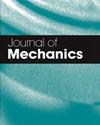Study on supercritical methane flow and heat transfer performance in a 180-degree curved duct
IF 1.8
4区 工程技术
Q3 MECHANICS
引用次数: 0
Abstract
In this paper, an investigation into flow and heat transfer performance of supercritical methane (S-CH4) in a 180-degree curved circular duct has been numerically carried out. The mathematical description of energy equation induced by the Dean vortices under the Cartesian-coordinate is first deduced. After validating the dynamic computational fluid dynamics model and method against the public experimental data, the effect of mass flux on the thermodynamics properties of S-CH4 is revealed. The calculation results show that due to the centrifugal force, the low temperature of S-CH4 gathers near the outer wall generatrix. Meanwhile, owing to the existence of multiple Dean vortices, all thermophysical parameters on the 90° cross-section are symmetrically concave along the vertical axis. The core position of multiple Dean vortices inside the curved duct is closer to the inner wall generatrix, which makes the velocity fluctuation greater. The maximum value of circumferential heat transfer coefficient on different cross-sections differs, and the non-uniform flow development process occurs inside the curved duct. Compared to the straight duct, when the mass fluxes are respectively 300 kg/m2 · s and 600 kg/m2 · s, the magnitude of increase in heat transfer coefficient of curved duct presents 18.8% and 23.5%. In addition, the forced convection caused by the secondary flow inside curved duct is so strong that the natural convection by the gravity could be neglected. The research outcome is of vital importance for the optimization design of liquefied natural gas vaporizer.180度弯曲管道内超临界甲烷流动及换热性能研究
本文对超临界甲烷(S-CH4)在180度弯曲圆管内的流动和换热性能进行了数值研究。首先推导了直角坐标系下迪安涡诱导能量方程的数学描述。通过对动力学计算流体力学模型和方法与公开实验数据的验证,揭示了质量通量对S-CH4热力学性质的影响。计算结果表明,由于离心力的作用,S-CH4的低温聚集在外壁母线附近。同时,由于多个Dean涡的存在,90°截面上的热物性参数沿垂直轴对称凹。弯曲导管内多个Dean涡的核心位置更靠近内壁母线,使得速度波动更大。不同截面上的周向换热系数最大值不同,弯曲管道内部出现非均匀流动发展过程。与直管相比,当质量通量分别为300 kg/m2·s和600 kg/m2·s时,弯曲管的换热系数增加幅度分别为18.8%和23.5%。此外,弯管内二次流引起的强制对流非常强,重力作用下的自然对流可以忽略不计。研究成果对液化天然气汽化器的优化设计具有重要意义。
本文章由计算机程序翻译,如有差异,请以英文原文为准。
求助全文
约1分钟内获得全文
求助全文
来源期刊

Journal of Mechanics
物理-力学
CiteScore
3.20
自引率
11.80%
发文量
20
审稿时长
6 months
期刊介绍:
The objective of the Journal of Mechanics is to provide an international forum to foster exchange of ideas among mechanics communities in different parts of world. The Journal of Mechanics publishes original research in all fields of theoretical and applied mechanics. The Journal especially welcomes papers that are related to recent technological advances. The contributions, which may be analytical, experimental or numerical, should be of significance to the progress of mechanics. Papers which are merely illustrations of established principles and procedures will generally not be accepted. Reports that are of technical interest are published as short articles. Review articles are published only by invitation.
 求助内容:
求助内容: 应助结果提醒方式:
应助结果提醒方式:


